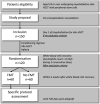Faecal microbiota transplantation to prevent complications after allogeneic stem cell transplantation for haematological malignancies: a study protocol for a randomised controlled phase-II trial (the FMT-allo study)
- PMID: 37130682
- PMCID: PMC10163541
- DOI: 10.1136/bmjopen-2022-068480
Faecal microbiota transplantation to prevent complications after allogeneic stem cell transplantation for haematological malignancies: a study protocol for a randomised controlled phase-II trial (the FMT-allo study)
Abstract
Introduction: Allogeneic haematopoietic stem-cell transplantation (allo-HSCT) is a major treatment for many haematological malignancies. The procedure has a good success rate but high transplant-related toxicity (TRM). TRM is mostly related to graft-versus-host disease (GvHD) and infectious complications. Alterations of the intestinal microbiota plays a major role in the development of allo-HSCT complications. The gut microbiota could be restored by faecal microbiota transplantation (FMT). However, there are no published randomised studies assessing the efficacy of FMT for GvHD prophylaxis.
Methods and analysis: This prospective, open-label, multi-centre, parallel-group, randomised phase-II clinical trial has been designed to assess the effect of FMT on toxicity in patients treated with myeloablative allo-HSCT for haematological malignancy. Based on Fleming's single-stage sample size estimation procedure, the design plans to include 60 male and female patients aged 18 or over per arm, to be randomly assigned to two groups, one with and one without (control group) FMT. The primary endpoint is GvHD-free relapse-free survival rate at 1 year after allo-HSCT. Secondary endpoints are outcome measures of the impact of FMT on allo-HSCT-related morbidity and mortality (overall survival and progression-free survival at 1 and 2 years, haematological parameters, infectious complications, tolerance and safety of FMT). The primary endpoint will be evaluated according to assumptions of the single-stage Fleming design, compared between groups by a log-rank test and further investigated in a multivariate marginal structural Cox model taking into account centre effect. The proportional-hazard hypothesis will be verified using Schoenfeld's test and by plotting residuals.
Ethics and dissemination: The local institutional review board (CPP Sud-Est II, France) issued approval on 27 January 2021. The French national authorities issued approval on 15 April 2021. The outcome of the study will be disseminated via peer-reviewed publications and at congresses.
Trial registration number: NCT04935684.
Keywords: Bone marrow transplantation; Leukaemia; Lymphoma; Myeloma.
© Author(s) (or their employer(s)) 2023. Re-use permitted under CC BY-NC. No commercial re-use. See rights and permissions. Published by BMJ.
Conflict of interest statement
Competing interests: None declared.
Figures

References
-
- Holler E, Butzhammer P, Schmid K, et al. Metagenomic analysis of the stool microbiome in patients receiving allogeneic stem cell transplantation: loss of diversity is associated with use of systemic antibiotics and more pronounced in gastrointestinal graft-versus-host disease. Biol Blood Marrow Transplant 2014;20:640–5. 10.1016/j.bbmt.2014.01.030 - DOI - PMC - PubMed
Publication types
MeSH terms
Associated data
LinkOut - more resources
Full Text Sources
Medical
Research Materials
Miscellaneous
